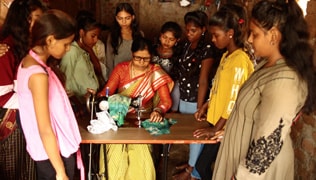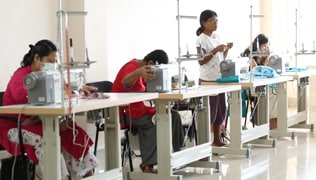- Home/
- Stories
Stories
Kushalta Ke Kadam: Raigad's Jayashree Became Sole Breadwinner For Her Family During Crisis
Written by Barkha Mathur | Thursday December 02, 2021USHA Silai School teacher Jayashree Ghodvinde of Raigad, Maharashtra took to stitching and became the sole breadwinner for her family when her husband lost his job shortly after their marriage
- Written by Barkha Mathur | Tuesday December 07, 2021
Kalawati Devi's Silai School worked nonstop during Covid, providing sustenance to her and her students
- Written by Barkha Mathur | Monday November 29, 2021
Here is how USHA Silai Schools supported Gouri Das and her students amid the COVID-19 pandemic and the livelihood loss caused by it
- Written by Barkha Mathur | Tuesday November 23, 2021
Bharti Kohade from MP overcame the financial hardships that her family was facing by learning the skill of stitching with help of USHA Silai School and has now become a saviour for other women and girls in her community
- Written by Barkha Mathur | Monday November 22, 2021
Paulina Tuti from Chirkubera village, Jharkhand had to struggle to make a life of her own in the area worst affected by Naxalism but with support from USHA Silai School, she not only started earning a livelihood but also started working towards protecting forests, water and other natural resources
- Written by Barkha Mathur | Tuesday November 23, 2021
USHA Silai School programme has not only skilled Gudiya Devi from Munga Dih village of Sonbhadra district, Uttar Pradesh to secure a livelihood, but also instilled the confidence in her to act as change maker in her community
- Written by Barkha Mathur | Friday January 29, 2021
USHA Silai School initiative partners with corporates to build skill and confidence among women from low-income families to help them become financially independent
- Written by Barkha Mathur | Saturday January 23, 2021
With an aim to promote sustainable living, USHA Silai School program has joined hands with institutions working on environmental issues
- Written by Barkha Mathur | Monday January 18, 2021
USHA Silai School is helping the survivors of rape and trafficking carve out their own destinies through stitching and sewing
- Written by Barkha Mathur | Monday January 11, 2021
As part of their Corporate Social Responsibility (CSR), Public Sector Undertakings like Central Mine Planning and Design Institute (CMPDI) and National Building Construction Corporation Limited (NBCC) have collaborated with USHA International Limited to set up Silai Schools around the mining area in Dhanbad and steel plant in Rourkela
Adopt a Silai School
About the Initiative

Kushalta Ke Kadam, an initiative by USHA Silai School and NDTV has entered its eighth season. The aim is to empower more women across rural India by teaching them sewing skills and helping them open new doors of opportunities for themselves. The initiative encourages rural women to become financially independent and entrepreneurs by taking up sewing and training others in their respective communities.
Since 2011, the USHA Silai School initiative has trained more than 12 lakh rural women through over 33,000 Silai schools, spanning over 20,751 villages across India.
The women earn Rs. 4,000 – 5,000 per month on an average, with the highest recorded monthly earning being Rs. 84,000 in a month. This earning works as a catalyst towards building their self-confidence, reducing gender inequities, and raising their stature within their families and in society at large.
In Pics

Rebari girls grow up learning traditional embroidery, which along with their new found sewing skills developed at Usha Silai Schools, is helping them earn a living.

Usha Silai School has empowered many rural women to support their family and send their children to school.

The Usha Silai School, established in a small nondescript village that goes by the name of Kottai, is helping empower people from varied communities.

The all-inclusive Usha Silai School Programme covers the entire nation from hamlets tucked between hills to villages cast by the sea.

Vegetables farmers from the Mizoram hills earn very little given the topography of the area. Usha Silai Schools have played an important part in this region by skilling women to financially contribute towards their households.

Usha Silai School learner Lucy has trained seven other women in her community, helping them to become financially independent.

Women like Kaviben from the nomadic Rebari community are finally laying down their roots as they begin to gain financial independence and thereby stability through Usha Silai School.

Usha Silai School, located in the Gujarat's Bhuj village, is enabling rural women to earn as much as Rs. 2,500-4,000 each month.

Usha Silai School, in association with a Gujarat based NGO called Kala Raksha, is trying to bring about a Silai revolution in Bhuj.

Besides training other women from their community, many Usha Silai School learners have become entrepreneurs in their own right.

With sewing becoming easily accessible and lucrative, the silai schools are also helping revive traditional motifs and designs.












